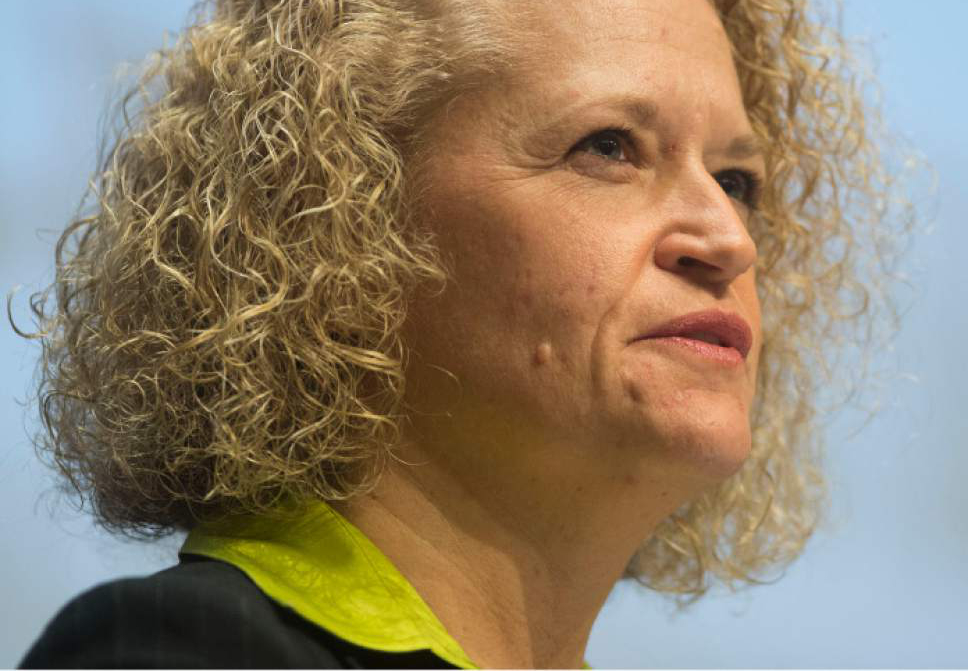This is an archived article that was published on sltrib.com in 2015, and information in the article may be outdated. It is provided only for personal research purposes and may not be reprinted.
One of the first orders of business for Jackie Biskupski, who is expected to become the capital's first openly gay mayor, is meeting with leaders of the Mormon church to sketch out their relationship going forward, including a discussion of the recent exclusionary policy on families of same-sex couples.
"I'm trying to get in for a meeting now," she said Tuesday on Trib Talk. "I definitely want to meet as soon as possible after Nov. 17 [when the vote is finalized] to talk about direction and issues, policies and different things."
She earlier had issued a statement expressing concern for a newly announced church policy that categorizes same-sex couples as apostates and excludes their minor children from Mormon rites, including blessings, baptisms and mission calls. She called the policy one that is "targeting children."
Biskupski said the "timing is peculiar" and suggested it was reaction not only to the recent legalization of same-sex marriage, which the church acknowledged, but also "potentially to my election."
She said it is critical that the mayor of the city where The Church of Jesus Christ of Latter-day Saints has its headquarters "maintain strong working relationships. And I just want to have a chance to have a personal conversation about this particular policy and the impacts it's having."
"Hopefully, we'll have a chance to rethink this a bit and move in a different direction somewhere down the road."
The former-legislator-turned-mayoral candidate said it's not the role of the Salt Lake City mayor "to draw lines, but it's my role to help people think much more broadly about policies and statutes and ordinances. It's a role I've been playing for a couple of decades now and a role I will continue to play."
Biskupski, battling a cold, broke her self-imposed silence on the election until the official vote canvass to appear on The Salt Lake Tribune's online interview program, but she didn't spell out specifics of her plans as mayor.
She identified beefing up the capital's housing stock, addressing the teeming homeless population and drug trafficking and economic development as her top priorities for the first 100 days and first full year in office.
That echoes her focus during the campaign, but she put little flesh on the bones of what a Biskupski administration will look like. While she talked generally about a change of direction, she backed off from suggesting she would take quick action to reverse any of two-term Mayor Ralph Becker's initiatives.
• On the state's decision to move the prison to the northwest part of the city, Biskupski, who had criticized Becker for not doing more to block it in the early stages, said, "I'm not sure we have a lot of avenues to stop the prison from moving." She said environmental studies need to be thorough and that is one potential opportunity to stop the relocation.
• On the 300 South bike lanes unpopular with some residents and businesses, she said, "It's not like I have a bulldozer ready to take out all that cement." She said she plans a study of bike-lane routes.
• On the appointment of Mike Brown as acting police chief, she declined to say whether he will remain on the job or be replaced. "He's doing OK," she said, repeating her earlier criticisms of the street-drug-dealing crackdown in the Pioneer Park area devised last summer by Brown and Becker.
• On the topic of whether she will orchestrate a wholesale replacement of key personnel in City Hall, she said "no decisions" have been made about the 111 employees that serve at the will of the mayor.
She did reiterate complaints about the recently adopted one-year moratorium on impact fees charged to developers in the city, saying the issue can and will be resolved "much quicker than a year."
She presented herself as a much more consensus-style, collaborative leader than Becker has been, while shrugging off questions about a rocky start to relationships with Salt Lake County Mayor Ben McAdams and five of the seven City Council members, all of whom endorsed Becker in the election.
"I don't hold grudges, it's not who I am," Biskupski said. "And we will find some common ground on issues we all care about and move forward."
In fact, she said, she expects the city and county to have a much more productive partnership than in the past, saying that "relationship has not been good." She said the only joint initiative that has emerged during the past decade is the under-construction performing-arts center downtown.
She acknowledged irritation during the campaign for an ad in which McAdams questioned her leadership ability and vision, and revealed that she personally called McAdams and suggested he pull the ad. He and the Becker campaign eventually did, she said, "and I think that was a wise choice on his part and the part of the Becker administration."
As for Becker's refusal to concede until the final canvass, despite what appears to be an all-but-insurmountable election margin for Biskupski, she said she understands his position.
"He just wants to be the mayor and needs to hold onto that little slice of hope," she said, calling his prospects for a come-from-behind victory "one in a million."
Becker campaign manager Matt Lyon says it makes sense to await the final, official election results before conceding, understanding that a Becker victory is "unlikely, but not impossible."
"The canvass is what holds," Lyon said, adding that, in the meantime, Biskupski is free to take whatever steps toward a transition she deems appropriate.



